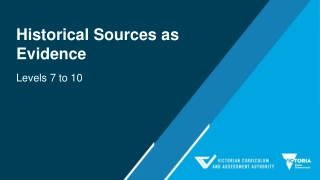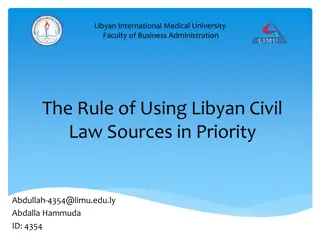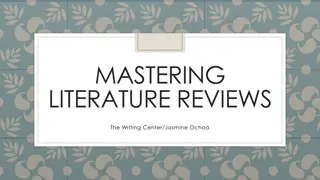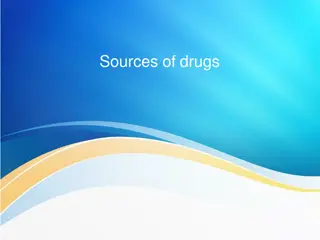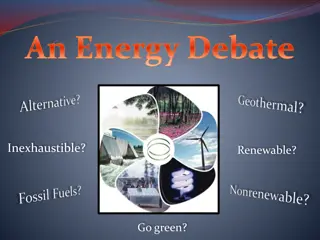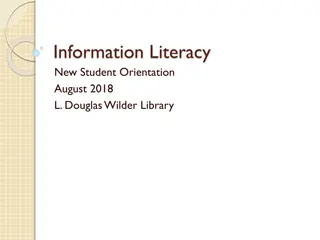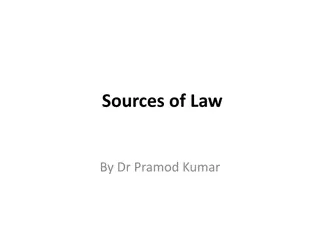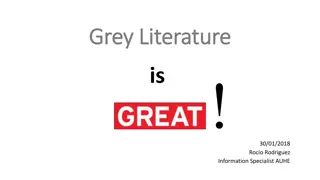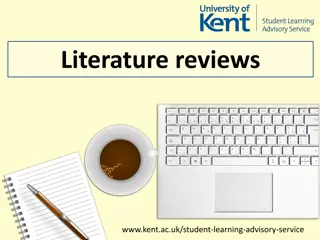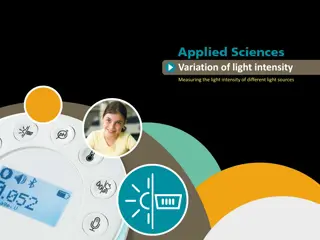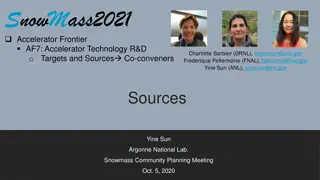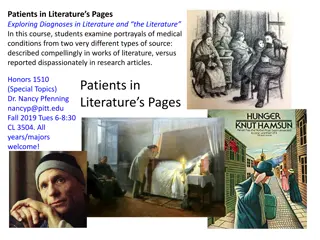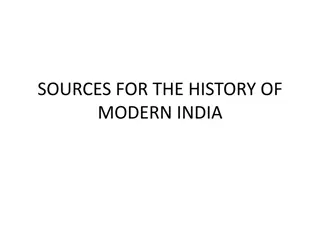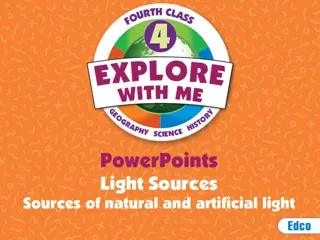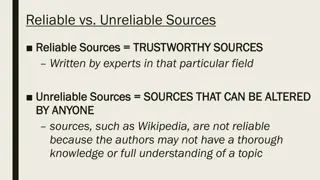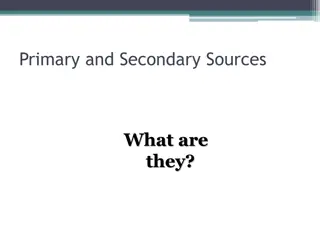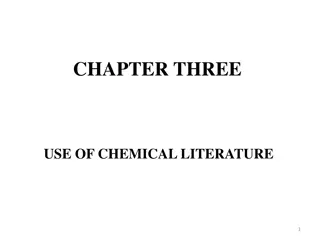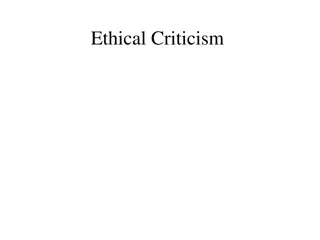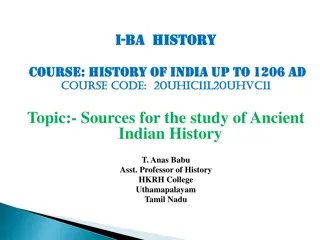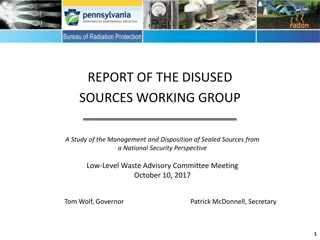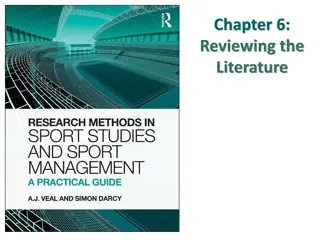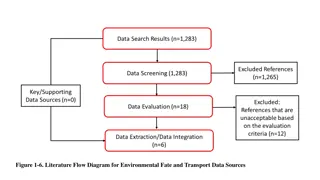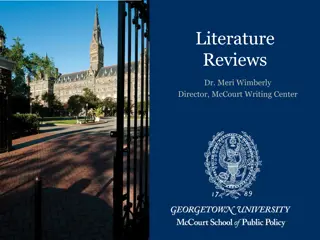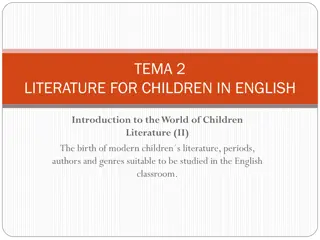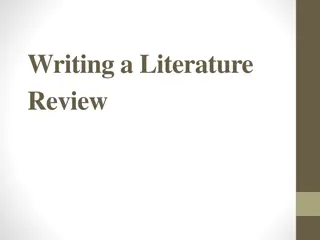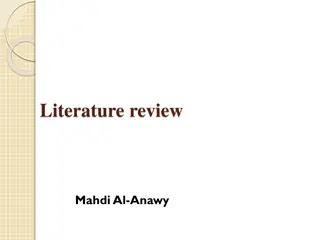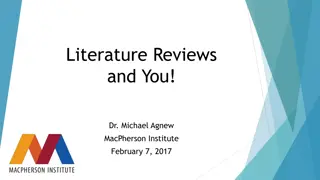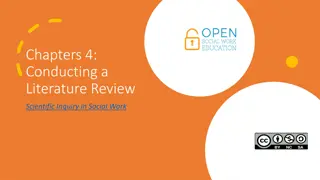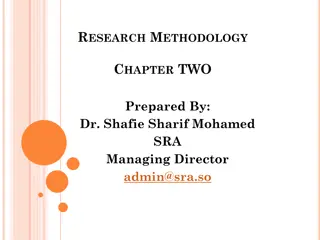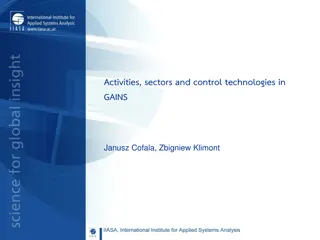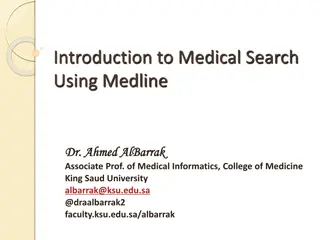Historical Sources as Evidence
Explore the importance of historical sources as evidence in the Victorian Curriculum History context, focusing on how students analyze, evaluate, and utilize sources to create historical explanations and arguments. Discover the significance of primary and secondary sources, perspectives of historica
1 views • 46 slides
Understanding Libyan Civil Law: Sources and Application
Civil law in Libya draws influences from Ottoman, French, Italian, and Egyptian sources, with a move towards a legal system based on Sharia. This article discusses the priority of using Libyan Civil Law sources and emphasizes the importance of laws that cater to the wellbeing of its citizens. The so
1 views • 7 slides
Mastering Literature Reviews: A Comprehensive Guide for Writing Success
A literature review is a critical discussion of relevant information on a specific topic, involving problem definition, interpretation, and identification of research gaps. It is not a mere collection of sources but a synthesis that guides further investigation. Incorporating APA style tips, this gu
1 views • 15 slides
Sources of Drugs and Their Origins
Drugs can be sourced from six major categories: plants, animals, minerals/earth, microbiological sources, semi-synthetic sources, synthetic sources, and recombinant DNA technology. Plant sources, being the oldest, provide various medicinal properties through leaves, flowers, fruits, seeds, roots, ba
0 views • 11 slides
Effective Strategies for Literature Searches and Re-Use of Scholarly Literature
Conducting literature searches involves surveying existing publications and information on a specific topic. Different search strategies, from simple searches to systematic queries and snowballing, are utilized based on research needs. Learning objectives include building search strategies, using ad
3 views • 19 slides
Understanding the Debate on Inexhaustible vs. Nonrenewable Energy Sources
The energy debate revolves around the classification of energy sources into nonrenewable, renewable, and inexhaustible categories. Fossil fuels, such as coal, petroleum, and natural gas, fall under nonrenewable sources due to their finite nature, while wind and tidal energy are examples of inexhaust
0 views • 18 slides
Introduction to Isixhosa Language and Literature - Exploring Characters and Themes
This content provides an overview of Isixhosa as a first additional language (FAL) and delves into key aspects of literature such as character development and themes. It discusses the importance of characters in storytelling, emphasizing the significance of round and flat characters. The article als
3 views • 28 slides
Comprehensive Literature Review Guidelines for Your Dissertation
Discover expert guidelines for conducting a thorough literature review in your dissertation. Explore topics such as literature search strategies, theoretical frameworks, review of the literature, synthesis, and analysis, with actionable tips provided throughout.
0 views • 11 slides
Understanding Information Literacy: A Comprehensive Guide for Students
Information literacy is crucial for academic success. It involves the ability to recognize the need for information, locate relevant sources, evaluate their credibility, and effectively use the information for research and presentations. Primary and secondary sources play a vital role in gathering i
0 views • 19 slides
Exploring the Significance of Persian Language and Literature in Indian History
Persian language and literature hold a crucial place in Indian history, serving as a prime source for understanding the medieval period. Scholars in India have dedicated their lives to preserving and promoting Persian history, language, and literature. The rich cultural heritage of India, dating bac
0 views • 9 slides
Mastering the Literature Review Process
Understanding the significance of literature review, this guide emphasizes the essential steps involved in conducting a successful literature review - from planning and research problem identification to critical analysis and contribution to existing literature. It explains the importance of develop
0 views • 16 slides
Understanding Sources of Law in Legal Systems
Exploring the sources of law, this content delves into the concept of formal and material sources categorized by legal scholars. It examines how legal systems differ in recognizing sources such as precedents, legislation, customs, and treaties. The focus shifts to Indian law, highlighting the signif
1 views • 23 slides
Effective Strategies for Conducting Business Research Literature Review
This literature review provides insights into conducting business research effectively, covering topics such as how to search, read, and write literature reviews, along with the goals and types of literature. It emphasizes the importance of generating research ideas, demonstrating knowledge, and int
1 views • 13 slides
Understanding Grey Literature in Health Sciences
Grey literature refers to information not traditionally published, crucial for avoiding bias, checking new research, and accessing valuable sources like clinical trial records and government reports. Learn about its importance, characteristics, assessment methods, and where to find grey literature f
0 views • 12 slides
Mastering the Art of Literature Reviews
Understanding what a literature review entails, preparing for it effectively, choosing the right material, and finding relevant sources are key steps to conducting a successful literature review for academic research purposes.
0 views • 16 slides
Understanding Light Intensity Variation in Different Sources
Explore the correlation between light intensity and efficiency in various light sources through an intriguing experiment. Delve into the theoretical framework and practical applications to grasp the essence of light intensity and its distribution. Uncover the factors influencing the efficiency of li
0 views • 21 slides
Accelerator Technology R&D Targets and Sources Overview
The SnowMass2021 Accelerator Frontier AF7 focuses on Accelerator Technology R&D, exploring targets and sources such as high brightness electron sources, muon sources, and high intensity ion sources. The community planning meeting discussed various Letter of Interest submissions outlining innovative
0 views • 7 slides
Exploring Diagnoses in Literature and the Literature
This course delves into portrayals of medical conditions in literature versus research articles. It explores the intersection of science and literature, analyzing works like "Black Swan Green" and "The Reason I Jump" to understand how they depict conditions like stuttering and autism. Through studen
1 views • 28 slides
Evolving Perspectives on Literature and Translation
Explore the intertwined relationship between national literature, comparative literature, and world literature, delving into the evolution of translation studies. Reflect on the shift from national literary histories to world histories of literature, highlighting the significance of world literature
3 views • 54 slides
Understanding the Sources for the History of Modern India
The sources for the history of modern India encompass literary sources such as printed books, government documents, newspapers, magazines, pamphlets, historical buildings, biographies, and memoirs. These sources provide insights into the political, social, economical, and cultural developments in In
0 views • 9 slides
Understanding Light: Sources and Properties
Light is a vital form of energy that enables vision and is emitted or reflected by various sources. Learn about natural sources like the sun, moon, fire, lightning, and luminous animals, as well as artificial sources powered by electricity. Discover how light waves travel, illuminating our world and
0 views • 18 slides
Understanding Reliable and Unreliable Sources for Research
Recognize reliable and unreliable sources for research. Reliable sources, such as books and peer-reviewed journals, are authored by experts in the field. Unreliable sources like Wikipedia and blogs can be altered by anyone. Learn how to evaluate the credibility of online sites based on their URLs an
0 views • 10 slides
Understanding Primary and Secondary Sources in Research
Primary sources provide firsthand information from the time period being studied, while secondary sources offer interpretations based on primary sources. Examples of primary sources include autobiographies, speeches, historical documents, published firsthand accounts, and sound recordings. Secondary
0 views • 23 slides
Understanding the Importance of Chemical Literature in Research
Reviewing chemical literature is essential in the research process to identify existing knowledge, develop hypotheses, plan methodologies, and discover unanswered questions. The vast and complex nature of chemical literature poses challenges in finding relevant information, especially with evolving
0 views • 22 slides
Exploring Ethical Criticism and Literature's Human Possibilities
Ethical criticism in literary studies revolves around the intersection of ethics, literature, and criticism. It tackles concerns about the relationship between value judgments, ethics, and aesthetics, emphasizing the importance of reconnecting criticism with moral principles. Literature offers a dee
0 views • 21 slides
Sources for the Study of Ancient Indian History: Literary and Archaeological Insights
Exploring the diverse sources available for studying Ancient Indian History up to 1206 AD, including literary works such as Brahmanical texts, epics like Ramayana and Mahabharata, Buddhist and Jaina literature, and archaeological sources like inscriptions, coins, and material artifacts. These source
0 views • 21 slides
Disused Sources Working Group Report on National Security Perspective
The Disused Sources Working Group (DSWG) report focuses on managing and disposing of sealed sources to reduce national security risks. Formed in 2011, DSWG developed recommendations to enhance the management of disused sealed sources. The report categorizes sealed sources based on potential harm and
0 views • 15 slides
Understanding the Importance of Literature Review in Research
Exploring the roles of literature in research, this content emphasizes the significance of reviewing existing literature to gather ideas, compare methodologies, and integrate supportive information. It also highlights the types of reviews and essential questions to consider during the literature rev
0 views • 12 slides
The Status of Literature in Secondary Schools of the O.E.C.S. - Research Findings by Dr. Anthony Felicien
Research by Dr. Anthony Felicien examines the status of literature in secondary schools of the O.E.C.S., focusing on the decline of interest in literature among students, influenced by historical curriculum changes and parental attitudes. The study highlights the importance of studying literature fo
0 views • 35 slides
Comprehensive Literature Flow Diagrams and Bibliographies on Environmental Fate, Transport, Release, and Exposure Data Sources
This compilation features detailed literature flow diagrams and bibliographies outlining data sources and evaluations related to environmental fate, transport, release, occupational exposure, consumer exposure, and hazard assessments. The diagrams provide insights into the interconnected pathways of
0 views • 13 slides
Mastering the Literature Review Process for Effective Research
Understanding the essence of literature reviews, this guide by Dr. Meri Wimberly delves into the significance of synthesis, identification of gaps in research, and informing research design. It navigates the phases of writing process, emphasizing preparation, composition, and finalizing with valuabl
0 views • 21 slides
Evolution of Children's Literature in English: From Alice to Modern Times
Explore the birth of modern children's literature starting with the publication of "Alice's Adventures in Wonderland" in 1865 by Charles Dodgson (Lewis Carrol), marking a shift towards entertaining and engaging literature specifically for children. Prior to this, children mainly read folklore and ad
0 views • 35 slides
Mastering the Art of Writing Literature Reviews
Understanding the essence of a literature review, its descriptive and analytical components, selecting key articles, and finding relevant sources are essential steps in crafting a comprehensive literature review. By integrating ideas from various sources and highlighting crucial findings, a literatu
0 views • 18 slides
Comprehensive Guide to Literature Review Process
A literature review is essential before conducting research to identify existing information, gaps in literature, major works, and relationships between studies and theories. Follow steps such as defining the topic, sourcing information, discussing findings, and drafting to write an effective litera
0 views • 8 slides
Mastering Literature Reviews: A Comprehensive Guide
Understanding the essence of literature reviews is crucial for academic success. A literature review situates your research within existing knowledge, defines key concepts, explains methodology, and identifies research gaps. It is not an annotated bibliography but a critical evaluation and synthesis
0 views • 17 slides
Mastering Literature Reviews in Social Work Research
Social workers, regardless of their practice area, must excel in conducting literature reviews to inform their work effectively. This involves synthesizing existing knowledge to build strong arguments and address crucial research questions. Learn the essential components of literature reviews, inclu
0 views • 11 slides
Effective Strategies for Conducting a Literature Review in Research Methodology
Understanding the importance of literature review in research methodology, this chapter discusses the objectives, aims, and guidelines for writing a comprehensive literature review. It emphasizes the significance of identifying gaps in existing knowledge, structuring the review, and organizing infor
0 views • 33 slides
GCSE English Language and Literature Overview
GCSE English Language and Literature subjects are led by Mrs. A. Baker and Mr. Doodson. English Language is examined by OCR, while English Literature is examined by Edexcel. Both subjects have two examination papers worth 100% of the grade. English Language papers focus on reading and writing skills
0 views • 14 slides
Activities, Sectors, and Control Technologies in GAINS Research
The GAINS research by Janusz Cofala and Zbigniew Klimont focuses on aggregation criteria for emission sources, macroeconomic parameters such as population and GDP, aggregation of energy-related sources, transport sources, and process sources. It also covers specific VOC processes/sources like solven
0 views • 13 slides
Effective Medical Literature Search Techniques by Dr. Ahmed AlBarrak
Dr. Ahmed AlBarrak, an Associate Prof. of Medical Informatics at King Saud University, provides valuable insights on medical literature search using resources like Medline. The content covers objectives of literature search, methods to find relevant literature, advantages of electronic journals, and
0 views • 39 slides
